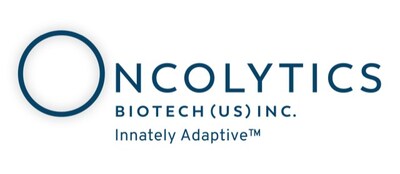Oncolytics Biotech® Announces Preliminary Collaboration with GCAR for Inclusion of Pelareorep in Anticipated Pancreatic Cancer Trial
Oncolytics Biotech (NASDAQ: ONCY) announced a preliminary collaboration with the Global Coalition for Adaptive Research (GCAR) to include pelareorep in a planned pancreatic cancer trial. The trial will use a combination therapy of checkpoint inhibition and chemotherapy, and aims to accelerate the development timeline while reducing costs. The adaptive Phase 2/3 design will assess multiple investigational therapies for metastatic pancreatic cancer, providing a potential registration pathway. Updated data from the GOBLET study showed a 62% objective response rate with pelareorep, nearly triple the historical control trials. This strategic collaboration is expected to advance the development of pelareorep to address urgent patient needs.
- Preliminary collaboration with GCAR for pancreatic cancer trial.
- Combination therapy includes checkpoint inhibition and chemotherapy.
- Adaptive Phase 2/3 design aims to shorten registrational study time and reduce costs.
- 62% objective response rate in GOBLET study with pelareorep, nearly triple historical control.
- Potential registration-enabling data to be produced.
- GCAR's extensive investigator network enhances trial capabilities.
- The collaboration is still preliminary, with planning activities ongoing.
- No definitive timeline for trial commencement or completion.
- Dependence on GCAR's trial design and network for success.
- Potential financial costs and resource allocation for the Phase 2/3 trial.
Insights
The collaboration between Oncolytics Biotech and GCAR is a promising development for the clinical trial landscape in pancreatic cancer. The inclusion of pelareorep in the planned adaptive trial is noteworthy because adaptive trials can significantly reduce the time and cost associated with clinical studies. This is particularly critical in the context of pancreatic cancer, which has one of the lowest survival rates among major cancers. The 62% objective response rate in cohort 1 of the GOBLET study is a strong indicator of pelareorep's potential efficacy, suggesting that this therapy could offer a meaningful treatment option for patients who have limited alternatives. From a research perspective, the ability to produce registration-enabling data through a streamlined process can accelerate the timeline for new treatments to reach the market, which is a substantial improvement over traditional trial methodologies.
For investors, this collaboration may be seen as a strategic move by Oncolytics Biotech to enhance its pipeline and create value. The adaptive trial design, which aims to cut registrational study time and reduce costs, could lead to significant financial efficiencies. If the data from the trial is favorable and leads to FDA approval, it could result in a lucrative opportunity for Oncolytics. Furthermore, partnerships with reputable organizations like GCAR may lend credibility and attract further investment. However, investors should also consider the inherent risks involved. Clinical trials, especially in oncology, are fraught with uncertainties and there's no guarantee of success despite promising preliminary data. Additionally, any delays or negative results could adversely impact the stock.
From a clinical standpoint, the planned trial represents a significant step forward in the treatment of pancreatic cancer. The adaptive design allows for a more flexible and responsive approach to evaluating investigational therapies. The potential for pelareorep to be combined with checkpoint inhibitors and chemotherapy underscores its versatility and could enhance its efficacy. The historical control trials have shown limited success in treating pancreatic cancer, so the nearly threefold increase in objective response rate is quite remarkable. This collaboration could pave the way for new treatment protocols that improve patient outcomes. However, while the results are encouraging, it is important to await the final data and peer-reviewed publications to fully understand the clinical impact.
Anticipated evaluation to include combination therapy featuring treatment regimen of checkpoint inhibition and chemotherapy utilized in cohort 1 of the GOBLET study
GCAR is launching a new master protocol for pancreatic cancer with the intent to create a registration-enabling pathway for investigational therapies
Innovative adaptive design could accelerate registrational study timeline and provide substantial cost savings compared to traditional trial designs
"We are thrilled to collaborate with GCAR and are honored that pelareorep has been selected as the first therapeutic for evaluation in GCAR's planned adaptive trial in pancreatic cancer patients. We believe this opportunity presents a strategic and efficient pathway forward for the development of pelareorep to address an urgent need for pancreatic cancer patients," said Dr. Matt Coffey, President and Chief Executive Officer of Oncolytics. "GCAR's anticipated trial design seeks to cut registrational study time and reduce trial costs, speeding up the journey to potentially deliver effective cancer treatment sooner. Through our interactions with GCAR, we have seen the strength of their capabilities and strong engagement with disease experts in pancreatic cancer. These attributes give us great enthusiasm to begin working together right away."
Meredith Buxton, PhD, MPH, Chief Executive Officer and President of GCAR, commented, "Our unwavering mission at GCAR is to accelerate the development of treatments for patients with deadly diseases such as pancreatic cancer. We believe that adaptive platform trials have the potential to achieve that mission and to be game-changing for patients. We are enthusiastic about collaborating with Oncolytics on our planned pancreatic cancer initiative, which was announced earlier this year, and we look forward to working with Oncolytics to advance our program."
Thomas Heineman, MD, PhD, Chief Medical Officer of Oncolytics shared, "The combination of pelareorep's impressive results to date and GCAR's innovative trial design creates a powerful path forward. This strategy, which includes leveraging GCAR's extensive investigator network, enhances our ability to quickly and effectively advance the development of this pelareorep-based combination therapy for PDAC. Updated data from cohort 1 of the GOBLET study, presented at the European Society for Medical Oncology (ESMO) Congress 2023, showed that patients treated with pelareorep combined with a checkpoint inhibitor, gemcitabine, and nab-paclitaxel experienced a
About Global Coalition for Adaptive Research
The Global Coalition for Adaptive Research (GCAR) is a 501(c)(3) non-profit corporation uniting physicians, clinical researchers, advocacy and philanthropic organizations, biotech/pharma companies, health authorities, and other key stakeholders in healthcare to expedite the discovery and development of treatments for patients with rare and deadly diseases. As a sponsor of innovative trials, including master protocols and adaptive platform trials, GCAR is dedicated to the advancement of science by modernizing clinical trials that support more efficient, less costly drug development. Adaptive platform trials deliver an unmatched accelerated time from discovery in the lab to implementation in the clinic resulting in better treatments and lives saved. GCAR announced in January 2024 plans to build a platform trial, utilizing a master protocol, for first- and second-line pancreatic cancer in the coming year. To learn more about GCAR and its initiatives, visit https://www.gcaresearch.org/.
References
- Von Hoff D et al. N Engl J Med 2013; 369:1691-1703 DOI: 10.1056/NEJMoa1304369
- O'Reilly et al. Eur J Cancer. 2020 June; 132: 112–121. DOI:10.1016/j.ejca.2020.03.005
- Karasic et al. JAMA Oncol. 2019 Jul 1; 5(7):993-998. DOI: 10.1001/jamaoncol.2019.0684
- Tempero et al. Ann Oncol. 2021 May; 32(5):600-608. DOI: 10.1016/j.annonc.2021.01.070
About Oncolytics Biotech Inc.
Oncolytics is a clinical-stage biotechnology company developing pelareorep, an intravenously delivered immunotherapeutic agent. Pelareorep has demonstrated promising results in two randomized Phase 2 studies in metastatic breast cancer and Phase 1 and 2 studies in pancreatic cancer. It acts by inducing anti-cancer immune responses and promotes an inflamed tumor phenotype -- turning "cold" tumors "hot" -- through innate and adaptive immune responses to treat a variety of cancers.
Pelareorep has demonstrated synergies with multiple approved oncology treatments. Oncolytics is currently conducting and planning combination clinical trials with pelareorep in solid and hematological malignancies as it advances towards registrational studies in metastatic breast cancer and pancreatic cancer, both of which have received Fast Track designation from the FDA. For further information, please visit: www.oncolyticsbiotech.com or follow the company on social media on LinkedIn and on X @oncolytics.
This press release contains forward-looking statements, within the meaning of Section 21E of the Securities Exchange Act of 1934, as amended and forward-looking information under applicable Canadian securities laws (such forward-looking statements and forward-looking information are collectively referred to herein as "forward-looking statements"). Forward-looking statements contained in this press release include statements regarding Oncolytics' belief as to the potential and benefits of pelareorep as a cancer therapeutic; the design intent and anticipated benefits of the GCAR study; our belief that the GCAR opportunity presents a strategic and efficient pathway forward for the development of pelareorep to address an urgent need for pancreatic cancer patients; our plans to advance towards a registrational study in metastatic pancreatic cancer; and other statements related to anticipated developments in Oncolytics' business and technologies. In any forward-looking statement in which Oncolytics expresses an expectation or belief as to future results, such expectations or beliefs are expressed in good faith and are believed to have a reasonable basis, but there can be no assurance that the statement or expectation or belief will be achieved. Such forward-looking statements involve known and unknown risks and uncertainties, which could cause Oncolytics' actual results to differ materially from those in the forward-looking statements. Such risks and uncertainties include, among others, the availability of funds and resources to pursue research and development projects, the efficacy of pelareorep as a cancer treatment, the success and timely completion of clinical studies and trials, Oncolytics' ability to successfully commercialize pelareorep, uncertainties related to the research and development of pharmaceuticals, uncertainties related to the regulatory process and general changes to the economic environment. In particular, we may be impacted by business interruptions resulting from COVID-19 coronavirus, including operating, manufacturing supply chain, clinical trial and project development delays and disruptions, labour shortages, travel and shipping disruption, and shutdowns (including as a result of government regulation and prevention measures). It is unknown whether and how Oncolytics may be affected if the COVID-19 pandemic persists for an extended period of time. We may incur expenses or delays relating to such events outside of our control, which could have a material adverse impact on our business, operating results and financial condition. Investors should consult Oncolytics' quarterly and annual filings with the Canadian and
Company Contact Jon Patton Director of IR & Communication | Investor Relations for Oncolytics Timothy McCarthy LifeSci Advisors +1-917-679-9282 |
Logo - https://mma.prnewswire.com/media/2408622/4706385/Oncolytics_Biotech_Inc_Logo.jpg
![]() View original content to download multimedia:https://www.prnewswire.com/news-releases/oncolytics-biotech-announces-preliminary-collaboration-with-gcar-for-inclusion-of-pelareorep-in-anticipated-pancreatic-cancer-trial-302145440.html
View original content to download multimedia:https://www.prnewswire.com/news-releases/oncolytics-biotech-announces-preliminary-collaboration-with-gcar-for-inclusion-of-pelareorep-in-anticipated-pancreatic-cancer-trial-302145440.html
SOURCE Oncolytics Biotech® Inc.








